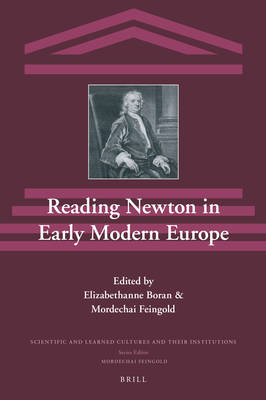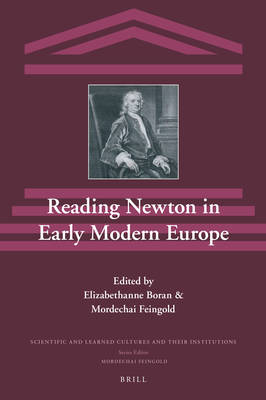
- Afhalen na 1 uur in een winkel met voorraad
- Gratis thuislevering in België vanaf € 30
- Ruim aanbod met 7 miljoen producten
- Afhalen na 1 uur in een winkel met voorraad
- Gratis thuislevering in België vanaf € 30
- Ruim aanbod met 7 miljoen producten
Zoeken
Reading Newton in Early Modern Europe
€ 213,95
+ 427 punten
Omschrijving
Reading Newton in Early Modern Europe investigates how Sir Isaac Newton's Principia was read, interpreted and remodelled for a variety of readerships in eighteenth-century Europe. The editors, Mordechai Feingold and Elizabethanne Boran, have brought together papers which explore how, when, where and why the Principia was appropriated by readers in Italy, Spain, the Netherlands, England and Ireland. Particular focus is laid on the methods of transmission of Newtonian ideas via university textbooks and popular works written for educated laymen and women. At the same time, challenges to the Newtonian consensus are explored by writers such as Marius Stan and Catherine Abou-Nemeh who examine Cartesian and Leibnizian responses to the Principia. Eighteenth-century attempts to remodel Newton as a heretic are explored by Feingold, while William R. Newman draws attention to vital new sources highlighting the importance of alchemy to Newton.
Contributors are: Catherine Abou-Nemeh, Claudia Addabbo, Elizabethanne Boran, Steffen Ducheyne, Moredechai Feingold, Sarah Hutton, Juan Navarro-Loidi, William R. Newman, Luc Peterschmitt, Anna Marie Roos, Marius Stan, and Gerhard Wiesenfeldt.
Contributors are: Catherine Abou-Nemeh, Claudia Addabbo, Elizabethanne Boran, Steffen Ducheyne, Moredechai Feingold, Sarah Hutton, Juan Navarro-Loidi, William R. Newman, Luc Peterschmitt, Anna Marie Roos, Marius Stan, and Gerhard Wiesenfeldt.
Specificaties
Betrokkenen
- Uitgeverij:
Inhoud
- Aantal bladzijden:
- 368
- Taal:
- Engels
- Reeks:
- Reeksnummer:
- nr. 19
Eigenschappen
- Productcode (EAN):
- 9789004336643
- Verschijningsdatum:
- 15/06/2017
- Uitvoering:
- Hardcover
- Formaat:
- Genaaid
- Afmetingen:
- 157 mm x 236 mm
- Gewicht:
- 517 g

Alleen bij Standaard Boekhandel
+ 427 punten op je klantenkaart van Standaard Boekhandel
Beoordelingen
We publiceren alleen reviews die voldoen aan de voorwaarden voor reviews. Bekijk onze voorwaarden voor reviews.










